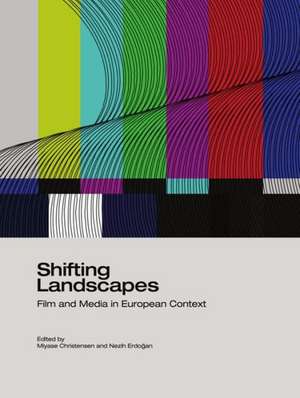Shifting Landscapes: Film and Media in European Context
Editat de Miyase Christensen, Nezih Erdoganen Limba Engleză Paperback – 31 mai 2009
Preț: 271.69 lei
Nou
Puncte Express: 408
Preț estimativ în valută:
51.99€ • 54.42$ • 43.02£
51.99€ • 54.42$ • 43.02£
Carte indisponibilă temporar
Doresc să fiu notificat când acest titlu va fi disponibil:
Se trimite...
Preluare comenzi: 021 569.72.76
Specificații
ISBN-13: 9781443805926
ISBN-10: 1443805920
Pagini: 365
Dimensiuni: 145 x 203 x 23 mm
Greutate: 0.5 kg
Editura: Cambridge Scholars Publishing
ISBN-10: 1443805920
Pagini: 365
Dimensiuni: 145 x 203 x 23 mm
Greutate: 0.5 kg
Editura: Cambridge Scholars Publishing
Notă biografică
Miyase Christensen is Associate Professor of Media and Communication Studies at Karlstad University. Dr. Christensen conducts research on areas including: globalisation and the political economy of media; media and information society policies; and media, identity, citizenship and politics. She is the author of a number of international articles and book chapters, and her current projects include a forthcoming book on European media and communications. Nezih Erdogan is Professor at Istanbul Bilgi University. He has published essays on melodrama and sound in Turkish popular cinema, and censorship in Turkey in international publications and contributed numerous chapters to various manuscripts on film and cinema. He is currently involved in a research project on the early years of cinema in Istanbul.
Recenzii
"Ambitious in both its intellectual and geographical scope, this volume provides us with an innovative and original understanding of what is happening in the new and rapidly changing European cinema scene - a very welcome intervention in an important cultural agenda." - Kevin Robins, City University, London "Miyase Christensen and Nezih Erdogan have edited an excellent book on film and media landscapes in the "new" Europe of the early twenty-first century. Incorporating eighteen individual chapters in three parts, the book re-examines what "European" media and cinema means during a period in which the geographical and cultural boundaries of "Europe" are still shifting, the media themselves are deeply influenced by the digital revolution, and audiences for "film" are constantly re-defining themselves. The book itself offers fresh perceptions across a range of different fields and should be of interest to all those fascinated by current trends in both film and media." Melvyn Stokes, University College London"
